LITERATURE & LURVE
Today I had a little chat with Michael Cathcart on Radio National’s Books and Arts Daily about Australian Love Stories, in which I have a… Read More »LITERATURE & LURVE
Today I had a little chat with Michael Cathcart on Radio National’s Books and Arts Daily about Australian Love Stories, in which I have a… Read More »LITERATURE & LURVE
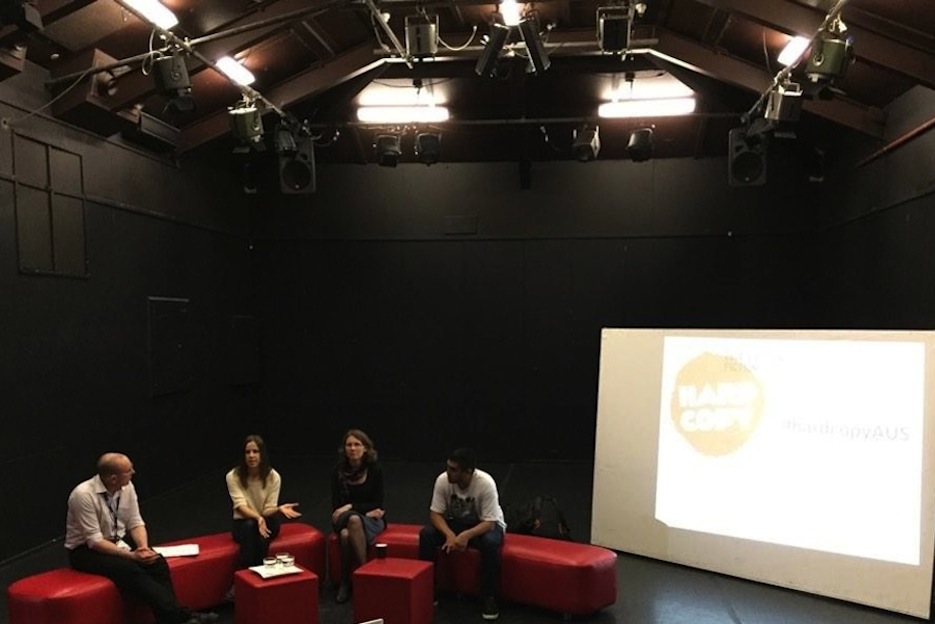 I was recently part of a panel on this topic with Omar Musa, Lucy Neave and Nigel Featherstone (Chair) for HARDCOPY. We had a wide-ranging and thoroughly enjoyable discussion and I thought it might be useful to pick up and elaborate on a few of the points discussed.
I was recently part of a panel on this topic with Omar Musa, Lucy Neave and Nigel Featherstone (Chair) for HARDCOPY. We had a wide-ranging and thoroughly enjoyable discussion and I thought it might be useful to pick up and elaborate on a few of the points discussed.
1. Your heart is published along with the book
Before this session I asked some fellow writers what they wished they’d known and Kim Lock put it beautifully when she said, ‘I didn’t realise quite how much of my heart would be published along with the book.’ She explained: ‘I found that reviews mattered and affected me far, far more than I’d anticipated they would. I found even the slightest criticism would stick with me for days.’
Having a book published can be a raw and vulnerable time, especially if reviews are excoriating. I’ve been fortunate that I haven’t experienced one of those yet (right now I’ve stopped typing to frantically touch wood, cross fingers and toes etc, though in truth it’s only a matter of time). But I clearly remember analysing one line in a review of Two Steps Forward for a good 10 minutes. It’s meaning was unclear but it sounded potentially negative. ‘Do you think the subeditors changed something?’ I said to my bloke, and we tried to guess what might have been altered, and what criticism the reviewer might have been trying to make. In the end I concluded that if I couldn’t work it out after 10 obsessive minutes of dissection then no one else would either.
Read More »WHAT I WISH I KNEW BEFORE I WAS PUBLISHED
Authors often talk (usually privately) about being floored by reviews, which is no doubt why some authors say they don’t read them (frankly, I don’t believe them). On the other hand, a thoughtful critique is like a gift. It can make you think about your work in a new light — both its successes and failures — which is invaluable. There was one review of Two Steps Forward that made me think deeply about the subconscious motivations for writing the characters I do. It gave me a new understanding of my work. That’s pretty incredible.
2. Know when to stick to your guns
Throughout the publishing process it’s important to know when to stick to your guns and when to compromise. I think I mostly get this balance right but I do have one small regret. Two Steps Forward was a title my publisher chose and I never much liked it. They decided that my original title, The Anatomy of Happiness, was too long and too literary. There are plenty of published titles of similar length, but they wanted something more accessible. The idea behind the Long Story Shorts series that Two Steps Forward was a part of was to make the short story appeal to a wider audience. If I was Tim Winton, I thought, I would stick to my guns, but as this was my debut collection I didn’t want to become one of those ‘difficult’ authors. I went back and forth with my publisher about the title but in the end acquiesced. If I had a time machine I’d pretend to be Winton and stick to my guns on this one. But I should add that this is my only minor regret in what was an exemplary publication process.
3. It’s tough out there
It’s been estimated that only one percent of all work submitted to publishers ever makes it into print. So it’s tough to get that first publication. What is probably less well known is that in the current climate it’s also tough to get the next book published. I know authors who’ve had two or three or more books published and are now struggling to find a publisher for their next book. Once upon a time I naively thought that with that first book the door to the publishing world opened and everything just rolled on from there. In truth it’s only the first door in a long corridor of doors.
4. Authors make a piddling about of money
Unless you’re Stephen King or JK Rowling you’re going to need to have another source of income other than advances and book sales. Natasha Lester wrote an honest and revealing article about this recently. She quotes stats that the average debut novel of an Australian author sells only 984 copies. Authors earn 10 per cent of the cover price, so for example $2.99 of a book with the rrp of $29.95. Therefore, 984 copies equates to just under $3K. And that’s for a book you might have spent three, five or 10 years writing. In short, when you sign your first book contract don’t ditch your day job.
5. There will always be doubt…
…and you just have to push through it. Personally, I have found it somehow reassuring that even the most accomplished writers are still filled with doubt about their ability. Interviewing Miles Franklin Award winner Roger McDonald was a revelation for me. He said, ‘Even when I’m close to finishing [a book], I’m thinking, ‘This is never going to work.’ That’s my struggle…it always seems just a little bit out of reach.’
Peter Carey puts it like this: ‘Writers spend a lot of their life failing at what they are doing. The chances are on any given day you are going to finish having not quite succeeded but you have that nasty feeling that there’s something false about what you have done. That process is painful: you are always filled with doubt.’ And yet there are days ‘when you are writing and you know you are doing something fabulous, and there’s no feeling like that on earth’. That’s what keeps us going, right?
Knowing that experienced authors like Roger and Peter still feel this way helps disempower my own doubt. It will always come and go, so you just have to get on with the writing in spite of it. We are all human, wrestling with the immense spirit of creativity. It’s one beautiful, messy, doubt-filled process.
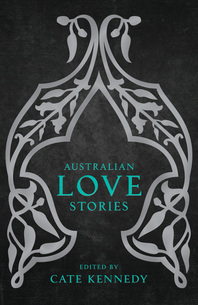 In the last couple of years I haven’t had much time for writing short fiction. I’ve been focussing on other writing projects and short stories have mostly been sidelined. As Lorrie Moore says, ‘a story can be like a mad, lovely visitor, with whom you spend a rather exciting weekend’, and I’ve missed that. But recently, in small pockets of space, I’ve been able to reengage with the form. This has led to my stories appearing in three very different publications, all of which I admire for different reasons. So as a way of celebrating my renewed love affair with the short story I thought I’d tell you about them.
In the last couple of years I haven’t had much time for writing short fiction. I’ve been focussing on other writing projects and short stories have mostly been sidelined. As Lorrie Moore says, ‘a story can be like a mad, lovely visitor, with whom you spend a rather exciting weekend’, and I’ve missed that. But recently, in small pockets of space, I’ve been able to reengage with the form. This has led to my stories appearing in three very different publications, all of which I admire for different reasons. So as a way of celebrating my renewed love affair with the short story I thought I’d tell you about them.
First up is a story called ‘The Little Things’ which will be published in Australian Love Stories, an anthology edited by Cate Kennedy. I was most chuffed to have my work selected by Cate, one of Australia’s finest short story writers. I have long admired her work, have devoured everything she has written, and the comments she wrote about my story (coming as they did on the back of two rejection letters for other pieces) meant more to me than she could have known. If that wasn’t enough the publisher, Donna Ward, emailed me to say: ‘It [‘The Little Things’] was the first on the list Cate sent me and has coloured, favourably, my whole experience of the book, and of life, really.’ Is there any more a writer could possibly hope for?
Australian Love Stories is out in October and features writers like Jon Bauer, Tony Birch, Carmel Bird, Lisa Jacobson, and fellow Long Story Shorts author Leah Swann. Its companion volume, Australian Love Poetry, edited by Mark Tredinnick, did extremely well when it was released earlier this year, so I’m thrilled to be keeping such talented company in the short story volume.
Read More »MAD, LOVELY VISITORS: NEW SHORT FICTION
The second story, ‘Travelling Left’, will appear in a new anthology, the Grapple Annual, which is aiming to carve out a niche and reputation much like the Sleepers Almanac. (Lovers of the short form will know how successful Sleepers Publishing’s annual Almanacs have become.) The Grapple Annual is the first publication for Grapple Publishing, a new independent publisher founded by Duncan Felton, who also happens to be one of the Scissors Paper Pen founders, a team that puts on a program of some of the most interesting and dynamic literary events around Canberra.
The Grapple Annual will feature a mix of poetry and fiction, both short and long. It’s often difficult to find a place for longer stories; literary competitions typically require 2-3000 words, and literary journals are similarly inclined. So I was pleased to discover that the Annual was accepting longer pieces because I’d just finished ‘Travelling Left’ (at 5000 words) and was wondering what to do with it. The Annual has a quirky premise—each story represents a date on the calendar and the Annual is aiming to eventually cover every day of the year. I’m glad to be a part of their inaugural line-up because with Felton at the helm I’d lay money the Annual will go gangbusters.
Finally to a s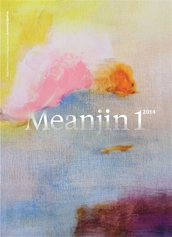 tory that has already hit the shelves in Meanjin (vol. 72, no. 1, 2014) called ‘The Company of Birds’. Meanjin is one of my favourite literary journals. I love what it does—the mix of essays, fiction, poetry, creative non-fiction, etc—as well as the design and feel of the publication. But it’s more than that. Meanjin was the first major literary journal to publish me. As one of Australia’s oldest and most revered literary journals, I felt I’d hit the jackpot. (I recall there was much celebratory champagne.) Back then Meanjin was publishing themed editions, and my story appeared in ‘Meanjin Does Drugs’. (One to make the parents proud.) Brett Whiteley, who was referenced in my story, ‘Great Pisses of Paris’, featured on the cover. (That story was subsequently included in my collection Two Steps Forward.) This time round Meanjin chose a Katsushika print to accompany ‘The Company of Birds’ without knowing how much I adore his work. Meanjin just gets me!
tory that has already hit the shelves in Meanjin (vol. 72, no. 1, 2014) called ‘The Company of Birds’. Meanjin is one of my favourite literary journals. I love what it does—the mix of essays, fiction, poetry, creative non-fiction, etc—as well as the design and feel of the publication. But it’s more than that. Meanjin was the first major literary journal to publish me. As one of Australia’s oldest and most revered literary journals, I felt I’d hit the jackpot. (I recall there was much celebratory champagne.) Back then Meanjin was publishing themed editions, and my story appeared in ‘Meanjin Does Drugs’. (One to make the parents proud.) Brett Whiteley, who was referenced in my story, ‘Great Pisses of Paris’, featured on the cover. (That story was subsequently included in my collection Two Steps Forward.) This time round Meanjin chose a Katsushika print to accompany ‘The Company of Birds’ without knowing how much I adore his work. Meanjin just gets me!
As for what these three stories are about you’ll have to read them for yourself and make up your own mind. The Meanjin issue is out now in print and also online, so if you fancy a squiz at ‘The Company of Birds’ click here. You’ll have to wait for the other two.
And here’s hoping I get more time this year with some other mad, lovely visitors.
 I was thrilled to be invited to talk on a panel of local authors — billed as ‘local treasures’ no less — at the National Conference of the Children’s Book Council of Australia. Motherhood and Mayhem was our topic — with three kids aged three to almost 11 could there be any literary panel more perfectly aligned with my life?
I was thrilled to be invited to talk on a panel of local authors — billed as ‘local treasures’ no less — at the National Conference of the Children’s Book Council of Australia. Motherhood and Mayhem was our topic — with three kids aged three to almost 11 could there be any literary panel more perfectly aligned with my life?
What any of us said on the day is a bit of a blur. There were lots of laughs, I remember that. And it was a joy to share the stage with Tania McCartney (Chair), Stephanie Owen Reeder and Tracey Hawkins. I somehow managed to cleverly position myself in front of the wine (what we all need at the end of the day) and perhaps not so cleverly in front of Tracey’s body parts (she’s an ex-cop and has been known to take inspiration from her former life).
I’ve never seen a panel on this topic before but last year when the four of us started discussing what we might do it seemed like an obvious choice. There are so many women out there trying to balance the need to write with the needs of family. And both are needs. If only the washing did itself, or writing paid enough to hire an in-house chef. One can dream.
Read More »MOTHERHOOD AND MAYHEM: CBCA CONFERENCE 2014
The question we all constantly get asked is, ‘How do you do it?’ I’m still not sure that I have an answer. What I do know is that I never stop. And I’ve got very good at wearing blinkers to shield me from the housework when I have a precious hour or two in which to write.
 The response to the panel was wonderful (and to the lady who said that I don’t look old enough to have an 11 year old — bless you a thousand times!). We knew when we were planning our topic that everyone could relate in some way or another to the challenges of multitasking. Lots of the teacher librarians came up to say that the whole juggling act was familiar territory managing classes of children. And then there were the mother/writers who sat in the audience nodding in recognition.
The response to the panel was wonderful (and to the lady who said that I don’t look old enough to have an 11 year old — bless you a thousand times!). We knew when we were planning our topic that everyone could relate in some way or another to the challenges of multitasking. Lots of the teacher librarians came up to say that the whole juggling act was familiar territory managing classes of children. And then there were the mother/writers who sat in the audience nodding in recognition.
I stumbled across this summary of the conference and love that we get a mention under the heading ‘Cool Canberra author chicks’! Angela Moyle goes on to say, ‘What a revelation!…These awesome ladies…have inspired me to make the time to write, and stop making excuses!’ Well now, that just makes me happy.
Yes, I’m still talking about Adelaide Writers’ Week! It was my first time there and I couldn’t possibly cram everything into one, or even two, posts. And I do want to talk about Richard Flanagan. I was ambivalent about attending his session. I have read and liked Flanagan’s work before but I had little interest in reading yet another war story. That is until I sat down and began listening to Flanagan. He read from The Narrow Road to the Deep North at the request o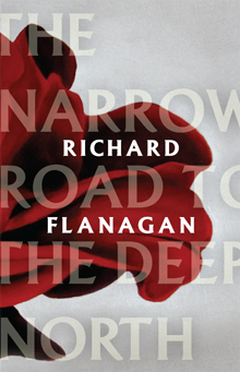 f interviewer Steven Gale, while insisting that he loathes readings because as a listener he finds his ‘eyes rolling into the back of the head’. But both his readings and the story behind the book moved me profoundly. He was extremely likeable and funny, too. A knock-out combination in the eyes of any festival programmer.
f interviewer Steven Gale, while insisting that he loathes readings because as a listener he finds his ‘eyes rolling into the back of the head’. But both his readings and the story behind the book moved me profoundly. He was extremely likeable and funny, too. A knock-out combination in the eyes of any festival programmer.
Flanagan’s father worked on the Thai–Burma railway, or Death Railway as it was known, and spoke of his experiences to Flanagan as a child. The conditions were unfathomable. Flanagan took 12 years and five different versions to find the right way into the story he wanted to tell. During research for the novel Flanagan visited Japan and interviewed one of the cruellest and most notorious guards at his father’s camp, known as The Lizard. He asked Flanagan to pass on to his father that he ‘was sorry’. When Flanagan did so during a phone conversation, his father fell silent, then hung up. From that moment on he had no memory of his experiences during the war and Flanagan felt that The Lizard’s apology had in some way released his father. Months later the manuscript of The Narrow Road to the Deep North was finished and Flanagan bundled it off to his publisher. That very night his father died. Flanagan considers this more than a coincidence. I don’t recall feeling close to tears at a festival before, but Flanagan took me there.
Read More »ADELAIDE WRITERS’ WEEK, PART 3
Then during question time, an audience member posed a question about asylum seekers, prompted by Flanagan’s piece in the new Saturday Paper (do read it here). Flanagan recounted how The Lizard had explained that they felt no compassion for these skeletal Australian men crawling around in the mud because ‘they didn’t consider them to be human’. In a similar way, we treat asylum seekers as if they are somehow less than human. This is dangerous territory. Like Indigenous Australians who were, until 1967, classified as flora and fauna, or the Jews in Nazi Germany (and any number of other examples), when we lose compassion for our fellow humans we commit terrible crimes. As Flanagan said, ‘It is a wicked poison for society to drink…that says it is good to be cruel.’ At this point in time both sides of politics are justifying their right to be cruel. No humane society should allow it.
While some authors — like Flanagan — shone more than others, the Festival organisers curated, without exception, a bunch of articulate, thoughtful and confident writers (bearing in mind Helen Dunmore’s truism: ‘None of the authors I’ve met are ever as confident as they appear…They are always more vulnerable and uncertain’). In fact, one of the authors I went to see — who is an old hand at festivals and exuded great confidence on stage — apparently threw up before going on, so terrible were this author’s nerves. This is somehow comforting for the rest of us!
Unfortunately the chairs were not as consistent as the authors, ranging from exceptional to pretty ordinary. A good interviewer brings out the best in their panellists so that the session flows and the interchange of ideas opens out. A poor interviewer results in a disjointed and awkward experience that authors must make the best of. Just because an individual is well regarded in the literary community and has an interest in the subject matter or the authors in question does not necessarily mean they have the skill to successfully chair a panel. For me, the two best interviewers at this festival were Steven Gale and Jeff Sparrow. Both were knowledgeable and relaxed in a way that set the authors and the audience (equally as important) at ease. They had notes but they referred to them in an unobtrusive way, rather than reading questions out word for word. (Of course, there were other good interviewers, too, but these two chaired multiple sessions.) Interviewing is a skill that is often underestimated. Except, perhaps, by authors. As Richard Flanagan noted, ‘Authors rise or fall on the strength of their interviewer.’
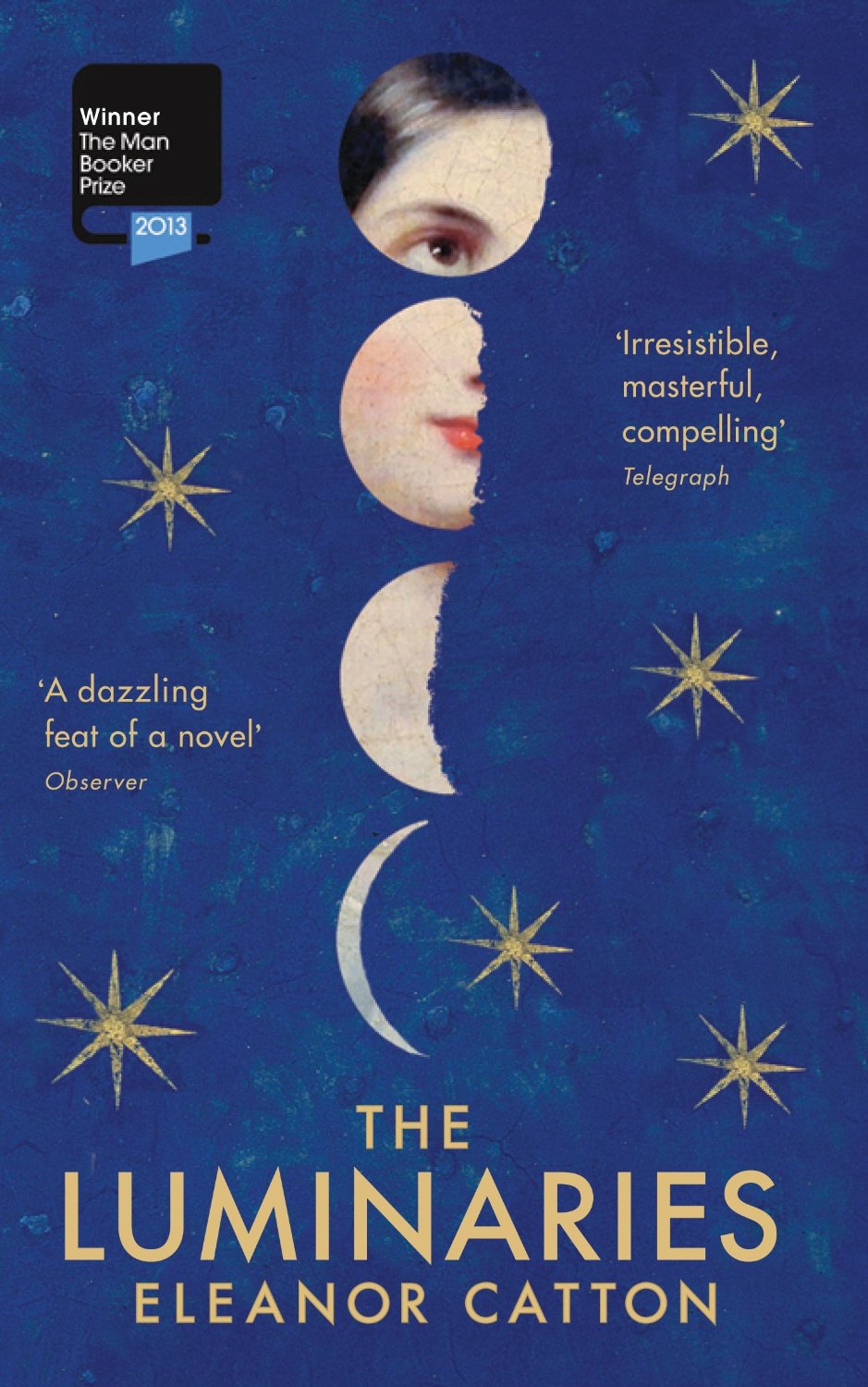 There’s still so much I haven’t been able to cover in these posts. New Zealand author and Booker Prize-winner Eleanor Catton was brilliant, managing to display both great intellect and great warmth. She gave us a detailed and fascinating insight into the research and structure of The Luminaries. I simply must read it now.
There’s still so much I haven’t been able to cover in these posts. New Zealand author and Booker Prize-winner Eleanor Catton was brilliant, managing to display both great intellect and great warmth. She gave us a detailed and fascinating insight into the research and structure of The Luminaries. I simply must read it now.
I am a long-time fan of Mandy Sayer’s work and she was both candid and funny during her session about her third memoir, The Poet’s Wife, which details her abusive relationship with Pulitzer Prize-winning American poet Yusef Komunyakaa. That one is also on the list.
Rabih Alameddine and Alison Bechdel were a riotous combination. Alameddine’s story about how he killed his five imaginary friends in a car accident was one of the more bizarre and hilarious stories I’ve heard at a festival. And Jeet Thayil and Christos Tsiolkas were delightful, often disagreeing in the most amenable ways. (And can I just say that the festival wrap-up party was like a Christos fan club. He is just the most genuine and likeable guy and not surprisingly everyone wanted to hang out with him.)
I came away from the festival buzzing, but now it’s time to put on the kettle and relax with my massive pile of festival books. The only question is, which one to start with?